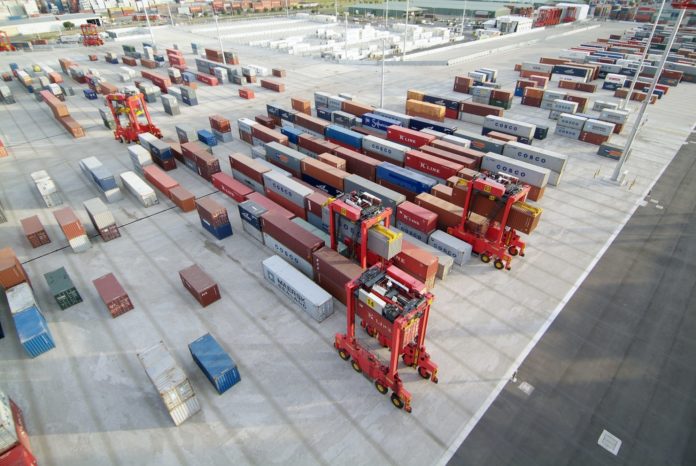US output could fall “a staggering 24%” in the second quarter of this year as the Danish consultancy Sea-Intelligence reports that a combination of the Covid-19 virus and the oil price war indicates that “the worst is ahead of us”.
According to financiers Goldman Sachs the US economy could shrink in the second quarter as the spread of the Coronavirus hits demand and ports are adding restrictions, banning vessels that have visited virus hit countries and shutting down when the staff has tested positive for Covid-19.
Even so the Feightos rate index shows some movement in the cost of freight transportation on the two major trades, on the Pacific and between China and Europe. On a weekly basis the average cost of an FEU from China to the US West Coast increased 10% to US$1460/FEU, US$140/FEU below the September rate.
On the Asia to Europe trades rates according to the Freightos index were down just 0.33% to US$1,448/FEU, well below the US$2,095/FEU high in January this year.
“These are trying times for the industry, and it is tempting to start to look for positive news in order to garner some hope, the current developments indicate that the worst is ahead of us. Last week’s assessment of a worst-case scenario of 10% demand decline – equal to 17 million TEU – unfortunately moved closer to reality,” said the Sea-Intelligence report.
However, there was some better news for Australian shippers as the Shipping Australia concerns over restrictions imposed by Maritime Safety Queensland (MSQ) were significantly eased, following the group’s letter last week.
Nevertheless, landside supply chains are still experiencing problems in Queensland, said Shipping Australia.
However, some difficulties still persist with the ship operators saying there was “a disturbing trend” where ship cancellations into the Port of Brisbane that potentially bring a range of unintended consequences to the Queensland economy, MSQ has announced a new “Two Port2 policy.”
This means that “Nearly all vessels arriving at the Port of Brisbane will now be able to berth and unload cargo provided their crew stay onboard. However, ships arriving from China and South Korea will still have to stay away until 14-days have passed since they were last in an overseas port.”
Shipping Australia went on to say that MSQ’s original policy restricting vessels from all ports, the state had issued exemptions for ships arriving from New Zealand, Papua New Guinea, the South West Pacific Nations and Singapore. However, “These exemptions are now effectively obsolete for ships calling at the Port of Brisbane. Shipping companies will no longer need to request these exemptions.”
Meanwhile, the oil price dispute between members of OPEC, the Organization of Petroleum Exporting Countries, and the so-called OPEC+ oil exporters who are non-OPEC members, is expected to have an effect on the shipping trade.
“On the positive side, this drastically lowers carriers’ costs as well as generates a positive cashflow effect. However, it also seriously undermines the investment case for scrubbers – we have seen the low-Sulphur premium drop from a peak around 300 USD/ton at the start of the year down to US$60/tonne,” said Sea-Intelligence.
Moreover, there are significant delays in scrubber installations in China caused by the virus lockdown. The collapse in the oil price, the substantial narrowing of the spread between the price of high and low sulphur fuels along with the above delays could mean that owners cancel scrubber installations.
“Instead [those vessels could] re-enter the operational fleet. This would add more capacity to a situation where demand is about to drop sharply,” explained Sea-Intelligence.
All the ingredients for a catastrophic commercial downturn are in the mix. Some operators, particularly in Italy where shipowners are warning that they could face substantial difficulties as a result of the Covid-19 virus, say they may not survive the crisis.
Nick Savvides
Managing Editor







